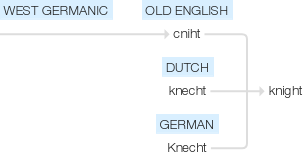Knight
Old English cniht ‘boy, youth, servant’, of West Germanic origin; related to Dutch knecht and German Knecht . knight (sense 2 of the noun) dates from the mid 16th century; the uses relating to Greek and Roman history derive from comparison with medieval knights.
wiktionary
From Middle English knight, knyght, kniht, from Old English cniht(“boy, servant”), from Proto-West Germanic *kneht.
From Middle English knighten, kniȝten, from the noun. Cognate with Middle High German knehten.
etymonline
knight (n.)
Old English cniht "boy, youth; servant, attendant," a word common to the nearby Germanic languages (Old Frisian kniucht, Dutch knecht, Middle High German kneht "boy, youth, lad," German Knecht "servant, bondman, vassal"), of unknown origin. For pronunciation, see kn-. The plural in Middle English sometimes was knighten.
Meaning "military follower of a king or other superior" is from c. 1100. It began to be used in a specific military sense in the Hundred Years War, and gradually rose in importance until it became a rank in the nobility from 16c. Hence in modern British use, a social privilege or honorary dignity conferred by a sovereign as a reward, without regard for birth or deeds at arms. In 17c.-19c. a common jocularism was to call a craftsman or tradesman a knight of the and name some object associated with his work; e.g. knight of the brush for "painter." Knight in shining armor in the figurative sense is from 1917, from the man who rescues the damsel in distress in romantic dramas (perhaps especially "Lohengrin"). For knight-errant, see errant.
The horse-headed chess piece so called from mid-15c. Knights of Columbus, society of Catholic men, founded 1882 in New Haven, Connecticut, U.S.; Knights of Labor, trade union association, founded in Philadelphia, 1869; Knights of Pythias, secret order, founded in Washington, 1864.
knight (v.)
"to make a knight of (someone), to dub or create a knight," early 13c., from knight (n.). Related: Knighted; knighting.
